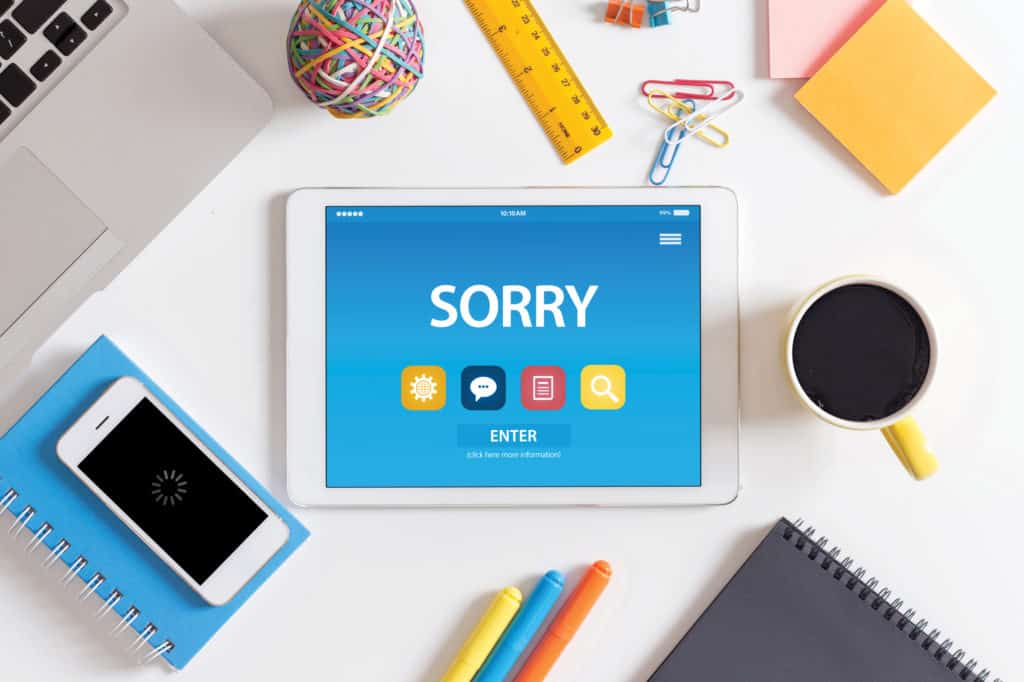Summary: Saying sorry too much makes you seem weak – right when, as a woman 50+, you’re growing bolder. Techniques to stop over-apologizing and a free printable checklist with what to say instead. (May contain affiliate links. Get info here. )
A plaintive bark cut through the early morning quiet. I’d left Pinky closed up in her private dining room, otherwise known as the guest bathroom.
I cracked open the door and Pinky, a sweet dog except at mealtimes, trotted out. “Sorry, girl,” I said reflexively.
Damn! I’d caught myself apologizing again without thinking.
“Sorry” can be so dangerous for us women over 50, the surgeon general’s warning should flash in our brains before it comes out of our mouths,
Use it at the appropriate occasion, “s
Why women should be careful saying sorry too much
Uttering “Sorry”, especially when you’ve done nothing wrong, makes us seem smaller, less capable. Sydney Beveridge put it best in Huffington Post.
“Sometimes it seems like women apologize for just plain existing.”
That’s especially deadly for women 50+ who are fighting the invisibility curse. Saying sorry too much sends a signal that we are trying to slip in unseen…to disappear.

I’m a recovering apology addict
I’m passionate about the dangers using the
I’ve regularly begged forgiveness from the following:
- Inanimate objects like a ottoman I bumped into
- Strangers on an elevator car that that has stopped on my floor so I could get on.
- Waiters when I needed more time to decide on what I wanted to eat. They’re called “waiters” for a reason.
A few years ago, my plummeting self-esteem staged an intervention.

Hitting bottom
A minor technical glitch slightly delayed a big presentation I was making when I was still in the corporate world. I blurted out “Sorry” before I could stop myself.
Even to myself, it sounded like I didn’t value my abilities or my product. We ended up winning the business but I vowed to stop with thoughtless apologies.
Compulsive apologizing presents as a weakness at work and in personal relationships
But it took one more realization to turn me into a vigilante against irresponsible use of “S
We need a guide for saying sorry
I joined my adult daughter and her girlfriends for a casual Wine Wednesday and realized they were all saying sorry too much – and when it was meaningless.
Like when reaching for the wine bottle. Or calling the waiter. Or maneuvering around a friend’s chair to go to the bathroom.
Psychology Today suggests that women may be more prone to over-apology than men. That happy hour proved it to me. And that we need a manual that lists the occasions when “Sorry” is fitting.
And when it’s the verbal equivalent of slouching, making us appear small.
But more importantly, this guide has get us ready with what to say instead.
When it’s okay to say you are sorry
1. If it’s bleeding
Someone is injured or hurt. Or gets a bad diagnosis. You feel an outpouring of love and sympathy for what they are going through or about to go through. Whether you caused it or not.
2. If It’s burning
Someone has suffered a big loss – maybe their house, neighborhood or city has burned, flooded, been blown apart by a tornado. You know what I mean. Their sense of security destroyed and they are desolate.

3. If it’s broken
Whether it’s a heart, a spirit, a dream, or something else equally irreplaceable. When a loved one dies, a relationship crashes, or a life’s work implodes. It’s obvious how badly someone is suffering and needs your
How to show empathy without saying “I’m sorry”
A situation doesn’t pass the smell test above? Decide which of the choices below is what you really mean to communicate.
1. “Thank you” or “Pardon/Excuse Me”
I have found myself apologizing other women coming out of a bathroom stall that I was waiting to enter. Saying “Thank you” because someone is holding the door is more gracious and shows appreciation.
Or “Pardon me” if I must maneuver around them.

1.“May I have a few moments, please”
Good for any time you need a little more time. You have to provide another form of ID and have to dig around in your purse to retrieve it. Or the menu is unfamiliar, and you want to look at it more thoroughly.
Those times when the word “sorry” has no actual meaning but it slips out.
3. “I’d like to ask a question” or “I’d like to say something”
With formal and informal meetings, we women tend to use “s
Men say, “I have a question about that.” Direct and unambiguous. If you need help making your questions just as direct, take time to read how to ask questions the right way.
If it is a particularly raucous group and you can’t get through, follow up with “Let me stop you there for a moment.”
“Stop” makes everyone take a breath. Follow up by asking for clarification or giving some missing information in a non-confrontational way.
And you can’t rant. Then you go from invisible to crazy. A small change but not what we are looking for.
4. “I apologize”
I know that sounds like saying sorry but it is not the same. “Sorry” is a feeling. Apologizing is an action. And actions are powerful.
Here’s how to apologize without saying “I’m sorry.”
Say something happens that inconveniences someone else. We’re late. We’ve missed a deadline. We don’t have what someone needs even though we said we would have it.
Now, if you’re habitually late, you need to quit that. Those other problems usually happen because of a circumstance out of our control.
How an apology can be empowering
Saying “I apologize” naturally flows into a reasonable explanation of what happened. Keep it to what happened and not why, which can sound like
Related: Using “Why” can make others defensive
Then share how you are going to do to fix that problem.
Problem-solving is a powerful superpower. Apologizing, explaining, and fixing a snag lets you demonstrate it in a way “Sorry” can’t touch.

How to practice not saying sorry too much
I know it is going to take some practice to get out of the habit of saying sorry, but it really helps grow bolder.
When you’re tempted to say sorry, pause for a minute: Is it bleeding, burning or breaking? If the answer is yes, go ahead.
And if circumstance doesn’t meet any of these conditions, consider what you are trying to say: “I need some more time to make a decision,” or “I would like to say something in this discussion.” Or “Pardon me.”
And save the “Sorry” for situations when it helps someone…not hurts us.
Download your free printable: 3 times when sorry is appropriate…and 4 phrases that say what you really mean
- 1. Download the free checklist. Join my weekly-ish newsletter here, and as a bonus, you’ll get printable!
- 2. Print a few copies and/or save to your Dropbox on your phone. Keep the checklist handy.
- 3. Practice getting comfortable with these tips in everyday situations. At the grocery store, in your book club, etc. Make these techniques second-nature.
Share what you’ve learned
In what situations do you slip up and say overuse
Please scroll down and leave a comment. We are all learning from each other!


I’m with you on the “sorry” abuse! From now on it’s out of my vocabulary, unless it’s one of the three criteria you outlined!